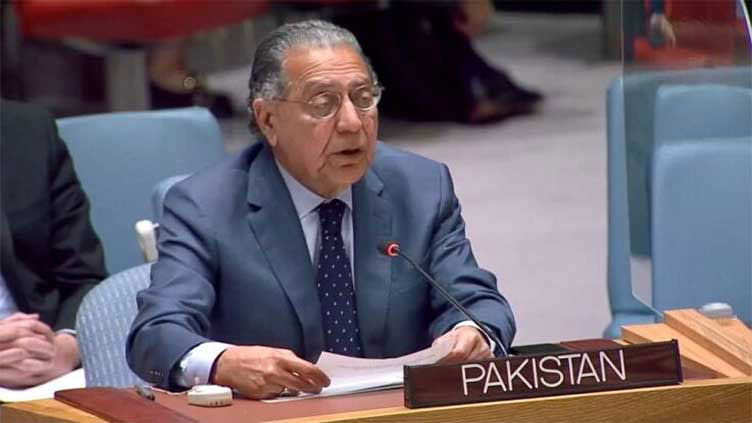At UN, Pakistan calls for representative governance in Syria to ensure country's unity

Pakistan
Ambassador Munir Akram said that today, Syria is at an important juncture in its history
UITED NATIONS (APP) - Pakistan has called for political inclusivity and representative governance in “fraternal” Syria following the overthrow of the Assad regime exactly a month ago, saying the process should be Syrian-led and Syrian-owned that is backed by the United Nations.
“Today, Syria is at an important juncture in its history,” Ambassador Munir Akram, Permanent representative of Pakistan to the United Nations, told the UN Security Council which debated the situation in that Arab country on Wednesday.
“The recent political developments offer the opportunity to restore normalcy, stability and peace in Syria,” he said, adding, “Yet this will depend on ensuring a peaceful transition to a new governance structure which is inclusive and stable and ensures Syria’s unity and territorial integrity.”
Earlier, Syria’s ambassador Koussay Aldahhak told the 15-member Council that the “dawn of freedom has broken”, and called on members of the UN to “respect the will of the Syrian people and its national choices.”
For this reason, he urged them to “immediately and fully lift unilateral coercive measures, to provide the necessary financing to meet humanitarian needs and recover basic services” and “to rehabilitate and reconstruct the damaged facilities and ensure demining.”
As the country is committed to improving conditions following 14 years of brutal conflict, the Syrian Ambassador called on the U.S. and other States to lift restrictive measures which targeted the previous regime.
Finally, he had a message for Israel in the Golan, “We stress the need to ensure that Israeli occupation entities do not take advantage of the current circumstances to violate Syria’s sovereignty in an attempt to impose a new reality through their military incursion to new parts of Syria,”
In his remarks, Ambassador Akram, the top Pakistani diplomat, welcomed the positive statements and assurances from the leaders and representatives of the interim government, saying, “These must be translated into policies and implemented in practice.”
The international community and this Council, he said, must address the danger of terrorism within and from Syria, especially in the still unsettled parts of the country, noting that the antecedents of some of the groups, and the reported presence of foreign fighters, dictates caution.
“Any resurgence of Al-Qaeda or ISIS related groups cannot be accepted,” the Pakistani envoy said, while recommending that the Monitoring Team of UNSC’s 1267 Sanctions Committee should continue to follow and report on the situation.
Ambassador Akram also called on the Security Council to seek objective information on the alleged presence of chemical weapons or capabilities in Syria.
He underscored the need for dealing with Syria’s massive humanitarian crisis immediately and unconditionally.
Seventeen million Syrians – more than 70 percent of the population – is in need of humanitarian support, it was pointed out. Over thirteen million Syrians have been displaced – 7 million internally and 6 million abroad. The recent escalation has further added to these needs with more than one million people displaced in a few weeks.
The UN Humanitarian Response Plan – which is only 33.3 percent funded – must mobilize all the resources required to meet the urgent needs of the Syrian people, including for the safe and dignified repatriation of Syrian refugees, including Turkiye, the Pakistani envoy stressed.
While calling for the restoration of Syria’s sovereignty and territorial integrity, Ambassador Akram said Israel’s occupation of the Syrian Golan Heights is illegal and “null and void” and that the Security Council must demand the occupying country’s full withdrawal.
“We strongly condemn Israel’s further incursion into the separation areas established under the 1974 Disengagement Agreement and its attacks on the UNDOF peacekeepers at Lebanon-Israel border. This incursion must end forthwith and the safety and security of UN peacekeepers assured”, he said.
The Pakistani envoy also urged the international community should help the new Syrian authorities to revive Syrian institutions and implement plans for the early reconstruction of their devastated country.
“The role of the United Nations, especially the Security Council and the Secretary-General, will be indispensable to ensure effective action on … the challenges confronting Syria and its proud and resilient people,” Ambassador Akram added.
In his opening remarks, UN Special Envoy for Syria Gier Pedersen told the Council there have been “multiple reports of incidents of violence” particularly in the coastal region and Homs and Hama and there remains “very real threats to Syria’s sovereignty, unity and territorial integrity,” with the ISIL terror group a significant concern.
UN Emergency Relief Coordinator Tom Fletcher highlighted three critical humanitarian challenges: preserving and rebuilding the country’s services, prioritising protection of civilians and ensuring women and girls are not marginalized.
He said aid efforts have been able to resume at a greater scale – as the situation has stabilized.


